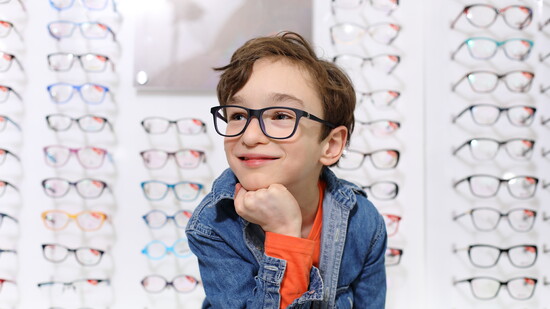Clear vision plays a crucial role in every aspect of a child's life—from learning and reading to playing sports and building social connections. Yet, vision issues in children often go unnoticed, since many kids may not realize that what they’re experiencing isn’t normal. Vision and learning go hand in hand. Up to 80% of learning in a child’s early years is visual, one in four children in the U.S. have a vision issue, and up to 60% of students with learning difficulties may have undiagnosed vision problems. An eye exam can make a dramatic difference in your child’s confidence and classroom success. Unfortunately, many parents are not aware of the importance of eye exams. The American Optometric Association recommends that children have their first eye exam at 6 months old, with follow-up exams at age 3 and again before they start kindergarten. These early exams help detect any potential vision issues and ensure your child is on track for healthy visual development. Even if your child seems to have good vision, it’s important to have their eyes checked regularly to catch any hidden problems early.
Dr. Wilder enjoys working with patients of all ages, but one of the most rewarding parts of her career has been helping children receive their first pair of glasses or contacts. With over 25 years of experience, she has had the unique joy of watching many of her young patients grow into adults—some of whom now bring their own children in for eye care. Dr. Wilder takes great pride in making eye exams a positive and comfortable experience for kids, and in helping families prioritize healthy vision at every stage of life. If your child has any conditions that could result in amblyopia (lazy eye), early diagnosis is critical. After approximately the age of seven the connections between the eye and visual areas of the brain are completed, making it unlikely to reverse amblyopia. Additionally, the incidence of myopia (nearsightedness) has been on the rise since the early 70s. By 2050 it is estimated that as high as 50% of the population will be nearsighted. Managing myopia to slow progression can reduce risks associated with high myopia such as retinal detachments, glaucoma, or myopic macular degeneration. Dr. Wilder can discuss options to slow myopia progression and keep your child’s eyes healthy for the long term.
If your child plays sports, good vision is essential for coordination, depth perception, and safety. Pediatric eye exams can help ensure their eyesight supports both academic and athletic success. Options like sports goggles, daily contacts, or orthokeratology (ortho-k) lenses can provide clear vision without getting in the way of your child’s active lifestyle.
Don’t worry if your child feels anxious about their eye exam. The team at Coastal Family EyeCare is great with kids and knows how to make the experience relaxing and enjoyable. Many children even leave saying they had a fun time! And if your child needs glasses, they have a fantastic selection of fun colors and styles that they’ll love to wear
Healthy vision helps children explore their world, connect with others, and perform their best at school and play. Regular eye exams are a simple yet powerful way to support your child’s success and well-being. At Coastal Family Eye Care, they specialize in pediatric eye health and make the process fun, friendly, and stress-free. Whether it’s your baby’s first checkup or your teen’s annual visit, their team is here to help your child see clearly and thrive.
